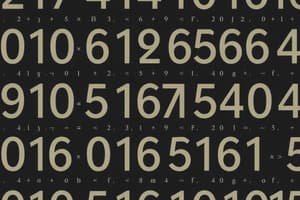Podcast
Questions and Answers
What is the foundation of numerical computation?
What is the foundation of numerical computation?
- Rational Numbers
- Fractions
- Real Numbers
- Integers (correct)
Which set includes positive and negative whole numbers, zero, and is represented by the symbol ℤ?
Which set includes positive and negative whole numbers, zero, and is represented by the symbol ℤ?
- Irrational Numbers
- Rational Numbers
- Integers (correct)
- Real Numbers
What type of numbers are ratios of two integers?
What type of numbers are ratios of two integers?
- Real Numbers
- Rational Numbers (correct)
- Fractions
- Integers
What are essential skills in numeric maths that help approximate the values of real numbers?
What are essential skills in numeric maths that help approximate the values of real numbers?
Which type of number includes irrational numbers like the square root of two or pi?
Which type of number includes irrational numbers like the square root of two or pi?
What is the purpose of scientific notation in numeric maths?
What is the purpose of scientific notation in numeric maths?
How is numeric maths applied in finance?
How is numeric maths applied in finance?
What is a common application of numeric maths in engineering?
What is a common application of numeric maths in engineering?
Why is numeric maths considered indispensable in problem-solving?
Why is numeric maths considered indispensable in problem-solving?
In what field are automated numeric reasoning algorithms gaining interest?
In what field are automated numeric reasoning algorithms gaining interest?
Flashcards are hidden until you start studying
Study Notes
Numeric Maths: A Focus on Core Foundations
Numeric maths, the foundation of numerical computation, is a vital part of our academic journey and everyday life. In this exploration, we'll examine the core concepts, applications, and future developments in this field.
Integer Arithmetic and the Integers
Integers form the basis of numeric maths. They consist of positive (-) and negative (+) whole numbers, zero, and a symbol (ℤ) to represent their set. Integers can be added, subtracted, multiplied, and divided (by non-zero numbers); their properties are fundamental to solving equations and understanding more complex number systems.
Rational Numbers
Rational numbers, including integers and fractions, are numbers that can be written as the ratio of two integers. Their basic operations are simple extensions of integers and can be completed using the principle of least terms and the order of operations.
Real Numbers
Real numbers include rational and irrational numbers, such as the square root of two or pi. Calculations with real numbers can be performed using algorithms like long division, decimal approximation, and calculators.
Rounding and Estimation
Rounding and estimation are essential skills in numeric maths. These techniques help us to approximate the values of real numbers, making calculations easier and more useful in practical applications.
Decimal Placement
The decimal placement of numbers is crucial in numeric maths. It allows us to express numbers with precision and accurately perform operations. Common decimal placements include whole numbers, integers, fractions, decimals, and scientific notation.
Scientific Notation
Scientific notation helps us represent large and small numbers in a compact form. It simplifies calculations and allows us to understand and manipulate numbers that cannot be expressed in common decimal form.
Applications of Numeric Maths
Numeric maths is used in a wide range of practical applications:
- Finance: Calculating interest rates, loan repayments, and investments.
- Economics: Analyzing market trends, economic indicators, and government budgets.
- Science: Measuring physical quantities, analyzing data, and interpreting experimental results.
- Engineering: Designing structures, analyzing systems, and optimizing processes.
Future Developments in Numeric Maths
With the rise of artificial intelligence, there is growing interest in developing automated numeric reasoning algorithms. These algorithms could assist in problem-solving, data analysis, and decision-making. Additionally, the use of alternate representations of numbers, such as complex numbers, quaternions, and matrices, is expanding the horizons of numeric maths in fields like physics and engineering.
In conclusion, numeric maths is an indispensable field that provides a solid foundation for important skills in problem-solving, critical thinking, and everyday life. The principles and applications of numeric maths continue to evolve, driven by technological advancements, and their significance will only grow as we harness the power of numbers to address global challenges and innovate for the future.
Studying That Suits You
Use AI to generate personalized quizzes and flashcards to suit your learning preferences.



